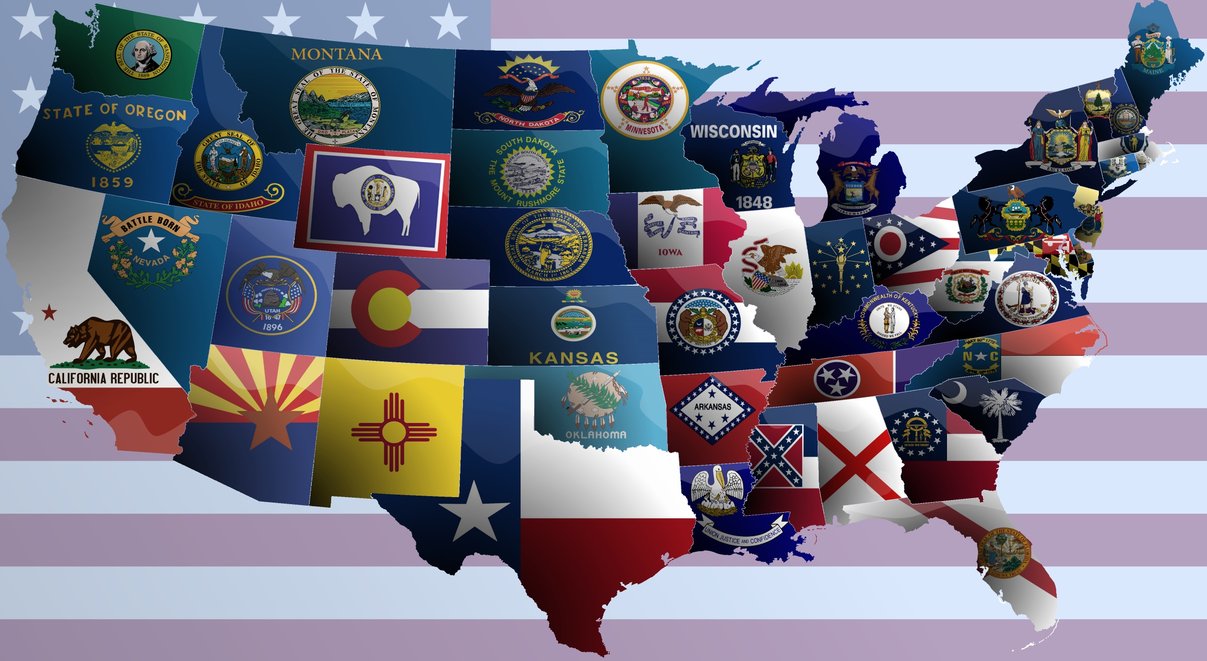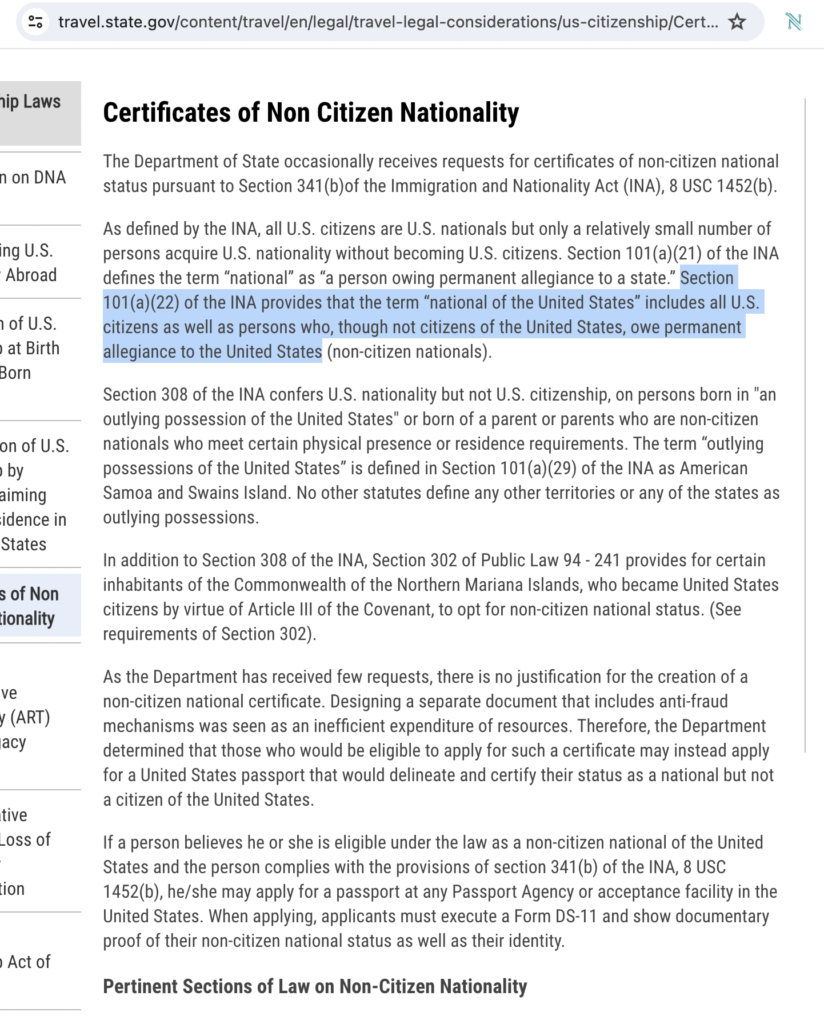Certificates of Non Citizen Nationality
The Department of State occasionally receives requests for certificates of non-citizen national status pursuant to Section 341(b)of the Immigration and Nationality Act (INA), 8 USC 1452(b).
As defined by the INA, all U.S. citizens are U.S. nationals but only a relatively small number of persons acquire U.S. nationality without becoming U.S. citizens. Section 101(a)(21) of the INA defines the term “national” as “a person owing permanent allegiance to a state.” Section 101(a)(22) of the INA provides that the term “national of the United States” includes all U.S. citizens as well as persons who, though not citizens of the United States, owe permanent allegiance to the United States (non-citizen nationals).

Section 308 of the INA confers U.S. nationality but not U.S. citizenship, on persons born in “an outlying possession of the United States” or born of a parent or parents who are non-citizen nationals who meet certain physical presence or residence requirements. The term “outlying possessions of the United States” is defined in Section 101(a)(29) of the INA as American Samoa and Swains Island. No other statutes define any other territories or any of the states as outlying possessions.
In addition to Section 308 of the INA, Section 302 of Public Law 94 – 241 provides for certain inhabitants of the Commonwealth of the Northern Mariana Islands, who became United States citizens by virtue of Article III of the Covenant, to opt for non-citizen national status. (See requirements of Section 302).
As the Department has received few requests, there is no justification for the creation of a non-citizen national certificate. Designing a separate document that includes anti-fraud mechanisms was seen as an inefficient expenditure of resources. Therefore, the Department determined that those who would be eligible to apply for such a certificate may instead apply for a United States passport that would delineate and certify their status as a national but not a citizen of the United States.
If a person believes he or she is eligible under the law as a non-citizen national of the United States and the person complies with the provisions of section 341(b) of the INA, 8 USC 1452(b), he/she may apply for a passport at any Passport Agency or acceptance facility in the United States. When applying, applicants must execute a Form DS-11 and show documentary proof of their non-citizen national status as well as their identity.
Pertinent Sections of Law on Non-Citizen Nationality
Section 341 of the Immigration and Nationality Act:
(b) A person who claims to be a national, but not a citizen, of the United States may apply to the Secretary of State for a certificate of non-citizen national status. Upon – (1) proof to the satisfaction of the Secretary of State that the applicant is a national, but not a citizen, of the United States; and, (2) in the case of a non-citizen national born outside of the United States or its outlying possessions, taking and subscribing, before an immigration officer within the United States or its outlying possessions, to the oath of allegiance required of an applicant for naturalization.
Section 101(a)(21) of the Immigration and Nationality Act:
The term “national” means a person owing permanent allegiance to a state.
Section 101(a)(29) of the Immigration and Nationality Act:
The term “outlying possessions of the United States” means American Samoa and Swains Island.
Section 101(a)(36) of the Immigration and Nationality Act:
The term “State” includes the District of Columbia, Puerto Rico, Guam, and the Virgin Islands of the United States.
Section 308 of the Immigration and Nationality Act:
Unless otherwise provided in section 301 of this title, the following shall be nationals, but not citizens of the United States at birth:
(1) A person born in an outlying possession of the United States on or after the date of formal acquisition of such possession;
(2) A person born outside the United States and is outlying possessions of parents both of whom are nationals, but not citizens, of the United States, and have had a residence in the United States, or one of its outlying possessions prior to the birth of such person;
(3) A person of unknown parentage found in an outlying possession of the United States while under the age of five years, until shown, prior to attaining the age of twenty-one years, not to have been born in such outlying possessions; and
(4) A person born outside the United States and its outlying possessions of parents one of whom is an alien, and the other a national, but not a citizen, of the United States who, prior to the birth of such person, was physically present in the United States or its outlying possessions for a period or periods totaling not less than seven years in any continuous period of ten years –
(A) during which the national parent was not outside the United States or its outlying possessions for a continuous period of more than one year, and
(B) at least five years of which were after attaining the age of fourteen years.
The proviso of section (301(g) shall apply to the national parent under this paragraph in the same manner as it applies to the citizen parent under that section.
Section 302 of Public Law 94 – 241:
Any person who becomes a citizen of the United States solely by virtue of the provisions in Section 301 [applying to those born in or residing in the Northern Mariana Islands] may within six months after the effective date of that Section or within six months after reaching the age of 18 years, whichever date is later, become a national but not a citizen of the United States by making a declaration under oath before any court established by the Constitution or laws of the United States or any other court of record in the Commonwealth in the form as follows ” I _____ being duly sworn, hereby declare my intention to be a national but not a citizen of the United States.”




